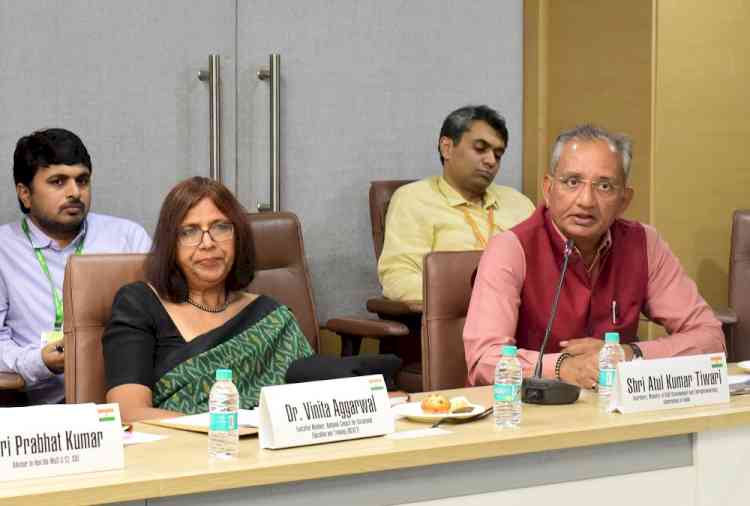Industry reactions on Union Budget (Part-16)

Dheeraj Hinduja, Executive Chairman, Ashok Leyland
“Union Budget 2023-24 is aligned with the Prime Minister’s vision of building a competitive and resilient India, with inclusive growth. The budget emphasises comprehensive national infrastructure development and expands on the digitization of the economy. The road transportation sector plays an important role in national development and would have an even more impactful role, going forward, in supporting the Government's vision. The announcement that old vehicles owned by the central government and state governments will be replaced as part of the vehicle scrapping policy presents a significant opportunity for fleet modernisation. This budget also echoes our sentiment and commitment to clean energy vehicles for a cleaner and greener future, as part of a national mission to achieve the net zero carbon emission goal.”
Shenu Agarwal, MD & CEO, Ashok Leyland
“The Finance Minister has presented a Budget for 2023-24 that is pro-growth and pro-development, with a focus on sustainable development, energy transition for a cleaner tomorrow, and inclusive growth through a tech-enabled economy. The budget further reinforces our nation’s ambition to make India "Atmanirbhar." The entire budget for this year addresses a wide range of topics to support the economy, including health, education, infrastructure, and agriculture.”
Madhusudan Ekambaram, Co-Founder & CEO, KreditBee
“The Union Budget has provided a very futuristic outlook into the government's vision for the financial sector and the fintech industry. The budget's focus on digitization and financial inclusion through facilities like Aadhaar, PM Jan Dhan Yojana, Video KYC, India Stack and UPI will help Fintechs innovate more in their service offerings. It will support sectoral growth, ease access to credit and encourage the entry of new players in the industry.
Simplification of KYC processes to be amenable as per evolving needs and adopting a risk based approach will ensure that resources are allocated in the most efficient ways based on priorities over processes.
Further, provisions regarding boost to digital infrastructure especially towards expanding the scope of Digilocker will help enhance credit availability to micro segments by making credit evaluation and document verification easier for fintechs and other financial institutions.
Lastly, the introduction of tax policies that favour the startup sector are also positive steps. Not only will it boost entrepreneurship in the country, but also provide an impetus to innovation and investment. Thus making this budget a step in the right direction for the fintech industry and the economy as a whole.”
V P Nandakumar - Managing Director & CEO of Manappuram Finance Ltd
"The key announcements around the MSME sector are likely to help the self-employed and small businesses. High focus on firming up digital infrastructure and capital expenditure will have a snowballing effect on employment generation and new business opportunities. Also, the Union Budget has given freedom of choice to the salaried class and professionals by making the new tax-regime as the default and increasing the taxable slab above Rs 7 lakh, and proposing to reduce the highest surcharge rate from 37% to 25% under the new tax regime. In my view, these measures will go a long way in sustaining the `India growth story’ by increasing the momentum in private consumption, which incidentally contributes to approximately 60% of the GDP and its growth, by ringing in fresh demand in the economy. On the other hand, it may also lead to a higher household savings rate in financial assets, which is very important for sustaining the overall economic growth of the country.”
Vishal Mehta, Managing Director, Infibeam Avenues Ltd
“Overall, all sector has been positively addressed by the Honourable Finance Minister. The best part is incentivizing the foreign data Centres players to set up their base at GIFT City. It’s a smart move by the government to address the concerns of the foreign data centre or cloud data centre players, as they were apprehensive or concerned about domestic law applicability on their operations.
Now, by offering Data Embassy at GIFT City for foreign data centre companies, Finance Minister Nirmala Sitharaman has solved their concerns. Gujarat International Finance Tech-city (GIFT) is India's first International Financial Services Centre (IFSC), and in the SEZ zone, the domestic law is not applicable, as SEZ zones are deemed foreign territory.
The way there is a separate regulation for Aircraft leasing at GIFT city; similarly, for other business verticals, in the same way, there will be foreign data centre-specific regulation for global players easing off their concerns. It seems this move of offering Data Embassy to the foreign data centres is to address their concern, which is an excellent move by the government.
Now there is a twin advantage. First, this move will attract global cloud data players to set up their base at GIFT city as a preparation towards complying with the Indian laws on data centres, which are expected to come up soon. Thus, the migration of large data centre businesses to India will start. Second, this will take care of data onshore, addressing the government’s needs or concerns, as now the data will not leave India’s shore, and yet it is equivalent to a global location (SEZ) where global players with ease can operate.
Infibeam Avenues Ltd also has its state-of-the-art data centre facility at GIFT city, and we believe the Data Embassy offer will also open the opportunity for us to collaborate with foreign data centre players.”
Vishwas Patel, Executive Director, Infibeam Avenues Ltd and Chairman, Payment Council of India
“This budget has given a digital boost for supporting and fostering an entrepreneurial ecosystem in the country for the coming generations. By recognizing the advent of Artificial Intelligence (AI) and spotting the vital role that AI is going to play in the economy, corporate, defence, healthcare and society in future, it has been a futuristic preparatory move where the government has shown its political will to focus on AI with development & setting up of three Centres of Excellence. The government is also quite sincere in its attempt to make India investment-friendly by pushing for ease of doing business. The Aadhar PAN card linking to Digi-locker for sharing with government departments as a common identifier will increase the ease of doing business and provide the requisite boost for entrepreneurial growth in the country.
Even though the government has already provided an increase of incentive amount of Rs 2600 crore under the scheme for promotion of RuPay Debit card and UPI for banks and fintech players, it would have been much supportive if the government could have accommodated the payment industry demand of Rs 8000 crore incentive.
However, the continuity of incentivizing digital payment growth is an excellent step by the government, but it is very crucial for the government to ensure that the allocated and disbursed funds reach the fintech players like PhonePay, CCAvenue, PayU and others. The banks have appropriated the funds, and till date the banks have not given out a single penny to the fintech players.
Further, the government should have made other sources of funds available locally for startups by incentivizing the insurance companies, EPFO, private pension funds and other domestic institutions to participate in investing in the burgeoning startup ecosystem. This would have met the capital requirements for the startups.
The union budget hasn’t attempted to fix the anomalies in startup regulations, conditions around the angel tax issue that requires to be simplified and tax holidays or lower tax structure for startups has been left unresolved. Even the strong demand from the startup community for taxing Employee ESOPs only at the time of selling the share has not been fulfilled. The government should consider expanding the scope of this relief to include more startups, irrespective of whether the startup is registered under the Department for Promotion of Industry and Internal Trade (DPIIT) or not. All startups should be treated equitably.
The increase from 7 years to 10 years for carrying forward losses by startups is a commendable step taken by Finance Minister Nirmala Sitharaman, along with tax reliefs given to the middle class and service class public by reducing the tax liability.”


 City Air News
City Air News 








